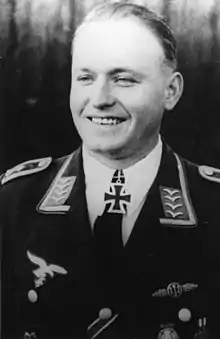Helmut Haugk
Helmut Haugk (24 February 1914 – 28 January 1992) was a Luftwaffe ace and recipient of the Knight's Cross of the Iron Cross during World War II. The Knight's Cross of the Iron Cross was awarded to recognise extreme battlefield bravery or successful military leadership. Haugk claimed 18 aerial victories in more than 440 flights.
Helmut Haugk | |
|---|---|
 Helmut Haugk | |
| Born | 24 February 1914 Gelsenkirchen |
| Died | 28 January 1992 (aged 77) Gelsenkirchen |
| Allegiance | |
| Service/ | |
| Years of service | 1937–45 |
| Rank | Hauptmann |
| Unit | ZG 26 ZG 101 ZG 76 |
| Battles/wars | World War II |
| Awards | Knight's Cross of the Iron Cross |
| Relations | Werner Haugk (brother) |
On 29 September 1939, while serving with 3. Staffel of Zerstörergeschwader 26 (ZG 26—26th Destroyer Wing), Haugk was shot down and wounded when in his Messerschmitt Bf 109 D-1 (Werknummer 481—factory number) during combat with Royal Air Force (RAF) Handley Page Hampden southeast of Heligoland.[1]
His brother Leutnant Werner Haugk, who had received the Knight's Cross of the Iron Cross as Fahnenjunker-Oberfeldwebel after approximately 300 combat missions on 8 August 1944, was shot down and killed in action on 18 October 1944 near Aalborg, Denmark by British fighters while flying a Bf 109 trainer.
Summary of career
Aerial victory claims
Mathews and Foreman, authors of Luftwaffe Aces — Biographies and Victory Claims, researched the German Federal Archives and found records for twelve aerial victory claims over the Western Allies, including one heavy bomber.[2]
| Chronicle of aerial victories | |||||||||
|---|---|---|---|---|---|---|---|---|---|
| Claim | Date | Time | Type | Location | Claim | Date | Time | Type | Location |
| – 7. Staffel of Zerstörergeschwader 26 –[3] Battle of France — 10 May – 25 June 1940 | |||||||||
| 1 | 14 May 1903 | 13:05 | Spitfire | north of Buzancy | 3 | 27 May 1940 | 15:15 | Hawk 75 | southeast of Reims |
| 2 | 3 June 1940 | 15:10 | Hawk 75 | southeast of Reims | |||||
| – 7. Staffel of Zerstörergeschwader 26 –[3] Battle of Britain and on the English Channel — 10 July – 31 October 1940 | |||||||||
| 4 | 10 July 1940 | 15:04 | Spitfire[4] | southeast of Dover | 6 | 28 September 1940 | 15:45 | Spitfire | south of Southampton |
| 5 | 26 September 1940 | 17:23 | Hurricane | south of Southampton | |||||
Awards and decorations
- Aviator badge
- Front Flying Clasp of the Luftwaffe in Gold
- Iron Cross (1939)
- 2nd Class (13 October 1939)
- 1st Class (23 May 1940)
- Wound Badge (1939)
- in Black
- in Silver
- Ehrenpokal der Luftwaffe (1 March 1941)[5]
- German Cross in Gold on 14 February 1942 as Oberfeldwebel in the 7./Zerstörergeschwader 26[6]
- Knight's Cross of the Iron Cross on 21 December 1942 as Oberfeldwebel and pilot in the 9./Zerstörergeschwader 26 "Horst Wessel"[7][Note 1]
Notes
- According to Scherzer as pilot in the 9./Zerstörergeschwader 26.[8]
References
Citations
- Prien et al. 2001, p. 557.
- Mathews & Foreman 2015, pp. 494–495.
- Mathews & Foreman 2015, p. 494.
- Cull 2017, Luftwaffe Fighter Claims & Operational Casualties, 10 July.
- Obermaier 1989, p. 129.
- Patzwall & Scherzer 2001, p. 169.
- Fellgiebel 2000, p. 216.
- Scherzer 2007, p. 370.
Bibliography
- Cull, Brian (2017). Battle for the Channel: The First Month of the Battle of Britain 10 July – 10 August 1940. Fonthill Media. ISBN 978-1-78155-625-2.
- Fellgiebel, Walther-Peer [in German] (2000) [1986]. Die Träger des Ritterkreuzes des Eisernen Kreuzes 1939–1945 — Die Inhaber der höchsten Auszeichnung des Zweiten Weltkrieges aller Wehrmachtteile [The Bearers of the Knight's Cross of the Iron Cross 1939–1945 — The Owners of the Highest Award of the Second World War of all Wehrmacht Branches] (in German). Friedberg, Germany: Podzun-Pallas. ISBN 978-3-7909-0284-6.
- Mathews, Andrew Johannes; Foreman, John (2015). Luftwaffe Aces — Biographies and Victory Claims — Volume 2 G–L. Walton on Thames: Red Kite. ISBN 978-1-906592-19-6.
- Obermaier, Ernst (1989). Die Ritterkreuzträger der Luftwaffe Jagdflieger 1939 – 1945 [The Knight's Cross Bearers of the Luftwaffe Fighter Force 1939 – 1945] (in German). Mainz, Germany: Verlag Dieter Hoffmann. ISBN 978-3-87341-065-7.
- Patzwall, Klaus D.; Scherzer, Veit (2001). Das Deutsche Kreuz 1941 – 1945 Geschichte und Inhaber Band II [The German Cross 1941 – 1945 History and Recipients Volume 2] (in German). Norderstedt, Germany: Verlag Klaus D. Patzwall. ISBN 978-3-931533-45-8.
- Prien, Jochen; Stemmer, Gerhard; Rodeike, Peter; Bock, Winfried (2001). Die Jagdfliegerverbände der Deutschen Luftwaffe 1934 bis 1945—Teil 2—Der "Sitzkrieg"—1.9.1939 bis 9.5.1941 [The Fighter Units of the German Air Force 1934 to 1945—Part 2—The "Phoney War"—1 September 1939 to 9 May 1940] (in German). Eutin, Germany: Struve-Druck. ISBN 978-3-923457-59-5.
- Scherzer, Veit (2007). Die Ritterkreuzträger 1939–1945 Die Inhaber des Ritterkreuzes des Eisernen Kreuzes 1939 von Heer, Luftwaffe, Kriegsmarine, Waffen-SS, Volkssturm sowie mit Deutschland verbündeter Streitkräfte nach den Unterlagen des Bundesarchives [The Knight's Cross Bearers 1939–1945 The Holders of the Knight's Cross of the Iron Cross 1939 by Army, Air Force, Navy, Waffen-SS, Volkssturm and Allied Forces with Germany According to the Documents of the Federal Archives] (in German). Jena, Germany: Scherzers Militaer-Verlag. ISBN 978-3-938845-17-2.
- Spick, Mike (1996). Luftwaffe Fighter Aces. New York: Ivy Books. ISBN 978-0-8041-1696-1.